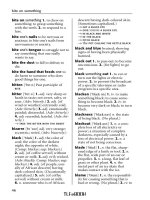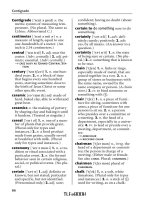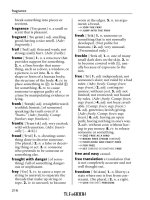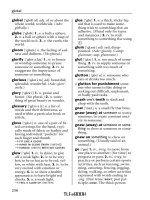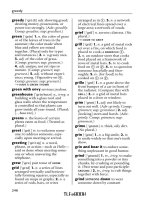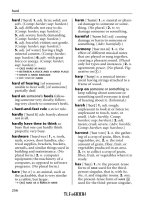Foreign Words and Phrases
Bạn đang xem bản rút gọn của tài liệu. Xem và tải ngay bản đầy đủ của tài liệu tại đây (131.76 KB, 18 trang )
I
f foreign words and phrases are all Greek to you, then this chap-
ter will be especially helpful. Many foreign terms are regularly used in
English communications, and you should be familiar with some of the
most common foreign words and phrases for your exam. Before you begin
learning and reviewing versatile verbs, take a few minutes to take this ten-
question Benchmark Quiz. These questions are similar to the type of ques-
tions that you will find on important tests. When you are finished, check
the answer key carefully to assess your results. Your Benchmark Quiz
analysis will help you determine how much time you need to spend on
reviewing foreign words as well as the specific words you need to learn in
order to increase your vocabulary power. This chapter presents 35 foreign
terms for your review.
Foreign Words
and Phrases
9
157
JUST IN TIME VOCABULARY
158
BENCHMARK QUIZ
Choose the word whose definition best matches the description.
1. an innovative play that uses an experimental style
a. apropos
b. mélange
c. avant-garde
d. imbroglio
e. vignette
2. the complete works of Shakespeare
a. blasé
b. milieu
c. zeitgeist
d. parvenu
e. oeuvre
3. a meeting at 7:00 at La Grange restaurant
a. par excellence
b. rendezvous
c. savoir faire
d. façade
e. debut
4. “work like a dog,” “sleep like a baby,” and other such overused sayings
a. cliché
b. bourgeois
c. insouciant
d. gauche
e. ennui
5. an avid sports fan
a. gestalt
b. hiatus
c. mélange
d. epitome
e. aficionado
FOREIGN WORDS AND PHRASES
159
6. an artist’s first gallery showing
a. ennui
b. imbroglio
c. parvenu
d. debut
e. façade
7. a temporary separation in a relationship
a. blasé
b. quid pro quo
c. hiatus
d. malaise
e. liaison
8. a world-renowned celebrity wearing a disguise
a. incognito
b. imbroglio
c. milieu
d. oeuvre
e. rendezvous
9. pretending not to be hurt by an insulting remark
a. ad hoc
b. gauche
c. cliché
d. façade
e. gestalt
10. someone who reports students’ questions and concerns to the dean
a. aficionado
b. liaison
c. parvenu
d. vis-à-vis
e. epitome
BENCHMARK QUIZ SOLUTIONS
How did you do on identifying foreign words? Check your answers here,
and then analyze the results to figure out your plan of attack for mastering
this topic.
JUST IN TIME VOCABULARY
160
◗
Answers
1. c. Avant-garde means using or favoring an ultramodern or experimen-
tal style; innovative, cutting-edge, especially in the arts or literature.
2. e. Oeuvre means (1) a work of art; (2) the total lifework of a writer,
artist, composer, etc.
3. b. The noun rendezvous means (1) a prearranged meeting at a certain
time and place; (2) a place where people meet, especially a popu-
lar gathering place. The verb rendezvous means to bring or come
together at a certain place, to meet at a rendezvous.
4. a. A cliché is a trite or overused expression or idea.
5. e. An aficionado is a fan or devotee, especially of a sport or pastime.
6. d. A debut is a first appearance in or presentation to the public.
7. c. Hiatus means a gap or opening; an interruption or break.
8. a. Incognito means with one’s identity concealed; in disguise or under
an assumed character or identity.
9. d. A façade is (1) the face or front of a building; (2) an artificial or decep-
tive front, especially one intended to hide something unpleasant.
10. b. Liaison means (1) a channel or means of connection or communi-
cation between two groups; one who maintains such communica-
tion; (2) a close relationship or link, especially one that is secretive
or adulterous.
BENCHMARK QUIZ RESULTS
If you answered 8–10 questions correctly, well done! You are already famil-
iar with many of these foreign words and phrases. Give the lesson a quick
review and do the practice exercise. If your score on the practice test is
equally high, move on to Chapter 10.
If you answered 4–7 questions correctly, you already know some of these
important foreign words and phrases, but you need more of these com-
monly tested terms in your permanent vocabulary. Be sure to set aside some
time to carefully review the vocabulary words listed in this chapter.
FOREIGN WORDS AND PHRASES
161
If you answered 1–3 questions correctly, it’s time to expand the number
of foreign words and phrases in your vocabulary. Study the lesson that fol-
lows carefully, and do the practice quiz on a separate sheet of paper so that
you can do the exercise several times if necessary. See the source listed in
Extra Help for more review and practice.
JUST IN TIME LESSON—FOREIGN WORDS
Unlike business, legal, or technical terms, which tend to appear in specific
contexts, the foreign words and phrases you are about to review can appear
in any context and have become part of our general English vocabulary.
Indeed, the more global our society becomes, the more foreign words and
phrases find their way into everyday use in the English language, and the
more important it is to learn these words and their meanings.
Many of the foreign words and phrases in this chapter have been adopted
into the English language because there are no English words that express
exactly the same meaning. No single English word, for example, expresses
the same idea as ad hoc, which means for a specific, often temporary, pur-
pose; for this case only. To convey the same idea in English, you would need
at least three or four words. Other foreign words listed here may have Eng-
lish counterparts but have become part of our language because of their par-
ticular connotation or stylistic flair. The French word gauche, for example,
is similar to the English word uncouth, but gauche is different enough in
sound and sense to warrant its inclusion and use in our language:
gauche: 1. lacking social graces or polish; without tact 2. clumsy or
awkward
uncouth: 1. crude, unrefined, lacking cultivation or taste 2. awkward,
clumsy, ungraceful
Similarly, another French word, insouciant, also has an English synonym,
but again, the foreign word carries a slightly different connotation and flavor:
insouciant: blithely unconcerned or carefree; nonchalant, indifferent
nonchalant: indifferent or cool, not showing anxiety or excitement
Insouciant, by the way, comes from the Old French verb soucier, meaning
to trouble, and the prefix in-, meaning not. Nonchalant is also a French
word, but it was adopted into the English language nearly two centuries ago
and therefore has lost its foreign flavor.
The 35 foreign words and phrases defined in this chapter come from the
French, Italian, German, Latin, and Greek languages. Because they are
used so frequently in everyday English communications, you can expect to
JUST IN TIME VOCABULARY
162
encounter many of them on your exam. Each definition includes a sample
sentence to show how the word or phrase is used in context. Learn these
foreign terms well to improve your test score, to understand more of what
you read, and to more accurately express yourself in your day-to-day com-
munications.
Note: As you study these words, be sure to pay extra attention to their
spellings—many words have tricky vowel combinations—and their pro-
nunciations. Because they are foreign words, you cannot be sure you are
pronouncing them correctly simply by sounding them out. Be sure to say
the words out loud as you memorize their meanings.
WORD LIST
ad hoc (
ad
·
hok
) adj. for a specific, often temporary, purpose; for this case
only. An ad hoc committee will be formed to investigate Stella’s allegations.
aficionado (
a
·
fish
·
yo˘
·
nah
·
doh
) n. a fan or devotee, especially of a sport or
pastime. Sal is such a Bruce Springsteen aficionado that he bought tickets to all
ten Giants Stadium concerts.
apropos (
ap
·
ro˘
·
poh
) adj. appropriate to the situation; suitable to what is
being said or done; adv. 1. by the way, incidentally 2. at an appropriate
or opportune time. Chancey’s comments may have been disturbing, but they
were definitely apropos.
avant-garde (
a
·
vahnt
·
ahrd
) adj. using or favoring an ultramodern or
experimental style; innovative, cutting-edge, especially in the arts or lit-
erature. Yvette prefers the avant-garde style of writers like Donald Barthelme
to the traditional narrative technique.
blasé (
blah
·
zay
) adj. 1. uninterested because of frequent exposure or
indulgence 2. nonchalant, unconcerned 3. very sophisticated. Quincy
has traveled so much that he speaks of exotic places such as Borneo in a totally
blasé manner.
bourgeois (
boor
·
zh
wah
) adj. typical of the middle class; conforming to the
standards and conventions of the middle class; hence also, commonplace,
conservative, or materialistic. Although she won millions in the lottery, Ada
still maintains her bourgeois lifestyle.
cliché (
klee
·
shay
) n. a trite or overused expression or idea. Tito has an orig-
inal and engaging writing style, but his storylines are such clichés.
debut (
day
·
byoo
) n. a first appearance in or presentation to the public.
Irina’s Carnegie Hall debut received rave reviews.
FOREIGN WORDS AND PHRASES
163
RULE BOOK: SAY IT AGAIN, SAM
It’s important to know how to pronounce any word that you plan to add
to your vocabulary, and it’s especially important to do so if you are deal-
ing with a foreign word or phrase. So say each word aloud several times
as you study. Once you pronounce it, you may realize that you are already
familiar with that term.
de facto (
dee
·
fak
·
toh
) adj. in reality or fact; actual. The king is only the nom-
inal head of the country; the de facto leader is the prime minister.
ennui (
ahn
·
wee
) n. boredom and listlessness resulting from something tedious
or uninteresting. The tour guide’s façade of enthusiasm could not hide his ennui.
epitome (
i
·
pit
·
o˘
·
mee
) n. 1. something or someone that embodies a par-
ticular quality or characteristic, a representative example or a typical
model 2. a brief summary or abstract. Einstein is the epitome of true genius.
ersatz (
e˘r
·
za˘ts
) adj. artificial; being an imitation or substitute, especially
one that is inferior. Though most of the guests couldn’t tell the difference,
Waldo knew that the dish was made with ersatz truffles.
façade (
fa˘
·
sahd
) n. 1. the face or front of a building 2. an artificial or decep-
tive front, especially one intended to hide something unpleasant.
Antoine’s stoicism is just a façade; he is really a deeply emotional person.
gauche (
ohsh
) adj. 1. lacking social graces or polish; without tact 2. clumsy
or awkward. Attila is so gauche that it’s embarrassing to be with him in public.
gestalt (
e˘
·
shta˘lt
) n. a configuration or pattern of elements so unified as a
whole that it cannot be described merely as a sum of its parts. One of the
fundamental beliefs of gestalt therapy is that we exist in a web of relationships
to other things, and that it is only possible to understand ourselves in the con-
text of these relationships.
hiatus (
h¯
·
ay
·
tu˘s
) n. a gap or opening; an interruption or break. After he was
laid off by the bank, Kobitu decided to take a long hiatus from the financial world
and took a job as a middle school math teacher.
hubris (
hyoo
·
bris
) n. overbearing pride or presumption. In the Greek
tragedy Oedipus Rex, Oedipus’s hubris leads to his downfall.
imbroglio (
im
·
brohl
·
yoh
) n. a confused or difficult situation, usually involv-
ing a disagreement or misunderstanding. In Shakespeare’s comedies, there
is often an imbroglio caused by a case of mistaken identity.
incognito (
in
·
ko
·
nee
·
toh
) adj. or adv. with one’s identity concealed; in dis-
guise or under an assumed character or identity. The star was traveling
incognito, hoping to find some measure of privacy on her vacation.
insouciant (
in
·
soo
·
si
·
a˘nt
) adj. blithely unconcerned or carefree; noncha-
lant, indifferent. Julian’s insouciant attitude about his finances will get him in
trouble someday.
E




